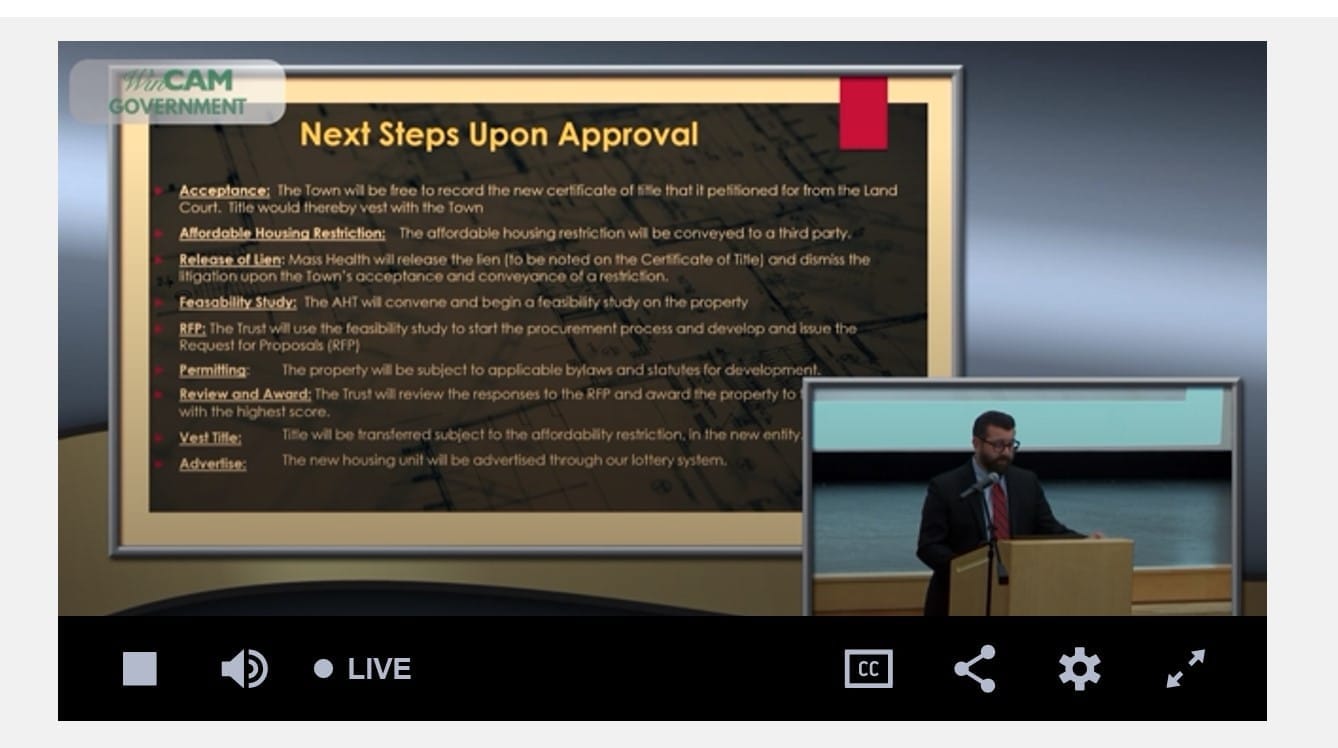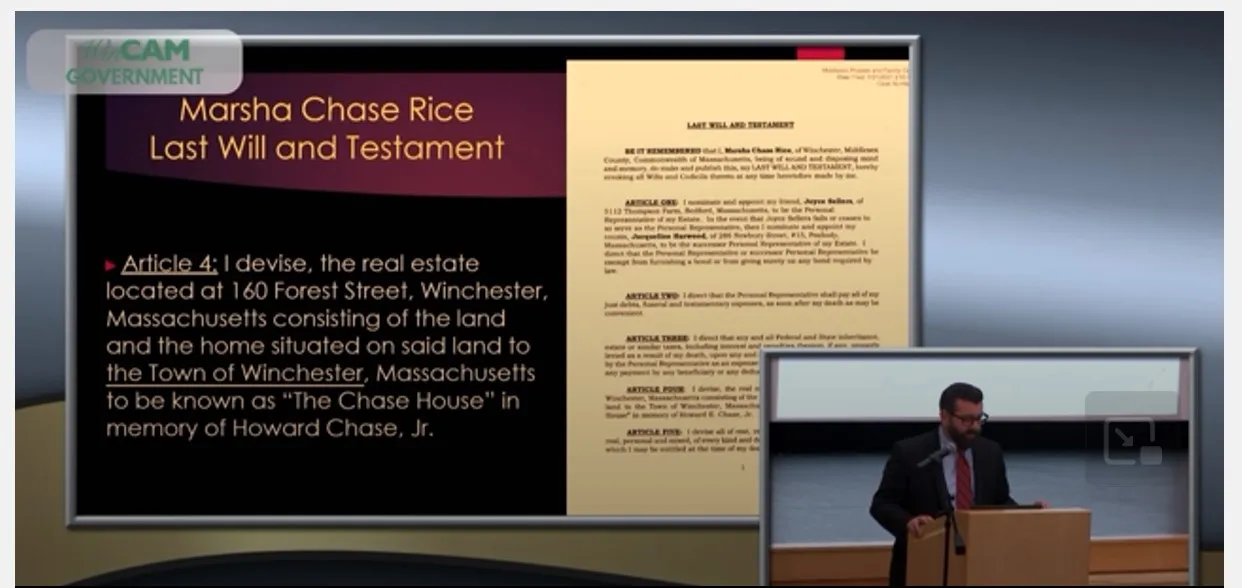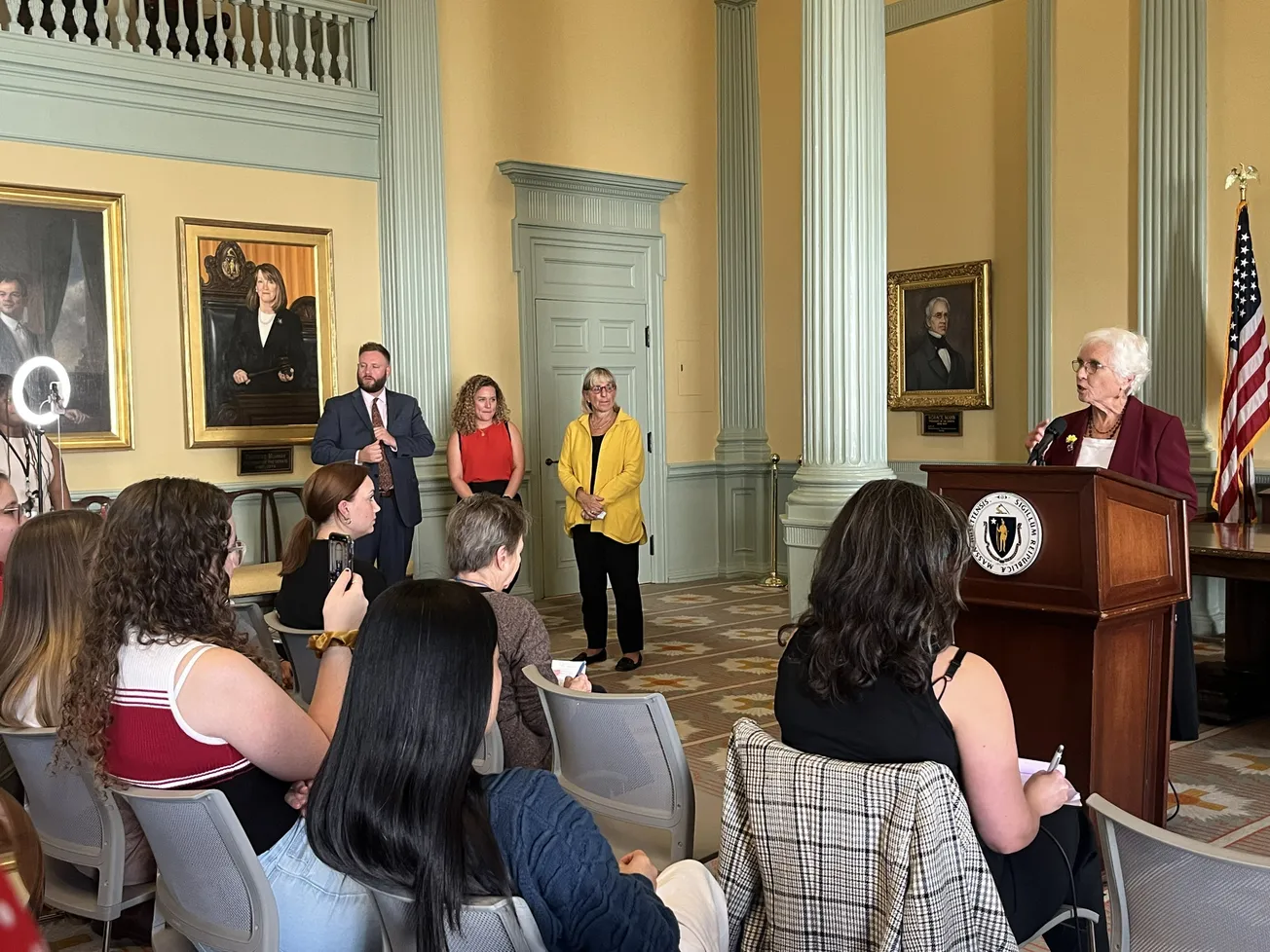Table of Contents
Fall Town Meeting 2024 is now in the books — but not without heated discussion on the future of a house willed to the town to be used as affordable housing.
Select Board member Michael Bettencourt kicked off the night’s longest debate with the introduction of Article 4, which effectively asked Town Meeting to permit the town to do the following three essential things with the property at 160 Forest St. willed by Martha Chase Rice when she died in November 2020:
- Accept the title for the property.
- Authorize the town to convey the property to a third-party non-profit with an affordable housing restriction.
- Convey the property to the Affordable Housing Trust (AHT) so it can proceed with work to develop the asset.
Bettencourt said the town gladly accepted Chase Rice’s gift, but ran into trouble when it was discovered MassHealth had a $700,000 lien on the property.
“MassHealth has worked with other communities to release liens [if the town turns the property] into affordable housing,” said Town Counsel Jay Talerman. “To our surprise — and I’ve never seen anything like this ever for MassHealth — they agreed. We moved quickly!”

Talerman said the town has been in Land Court, working with both MassHealth and Chase Rice’s estate to come to an agreement. He said the reason the town was asking for Town Meeting to move forward with Article 4 is because it recently received the long-awaited certificate for the new title.
And because Winchester only has until mid-January to settle with MassHealth and Chase Rice’s estate, it was imperative to approve the motion.
Talerman added by law, the town is not allowed to hold the title to the property and the affordable housing restriction.
Bettencourt said should Town Meeting vote down Article 4 on Nov. 18, the town would get nothing from the deal. The estate would probably sell off the property, he said, paying off MassHealth and any other creditors and keeping the rest of the profits.
Town boards on board
AHT Chair Marty Jones gave a brief history of the AHT, saying the 160 Forest St. was a project the board was excited to take on. She said the trust was created by Town Meeting in spring 2019 for just this type of eventuality.
She said AHT would create a framework whereby the process of turning the property into an affordable housing unit would be open to the public, from the initial assessment to the Request for Proposal to any future meetings.
She added it’s “not going to be easy to find someone who wants to work on one small property,” but said AHT was up for the challenge.
The Housing Partnership Board voted unanimously to support the project, as did the Planning Board. The Finance Committee took no action.
Town Meeting wants assurances
Monday night’s debate opened up with Doug Marmon, of Precinct 1, who said he was definitely in favor of the article and the affordable housing restriction.
However, Marmon wanted assurances from the Select Board that the Chase House, as Chase Rice wanted it referred to in her will, would remain standing.
Jack LeMenager, of Precinct 6, also said he’d like to see the house preserved.
Bettencourt said the board couldn’t make any promises, especially since the house is in need of between $300,000 to $400,000 in repairs. He added the board might be able to specify in an RFP that the house must be preserved.
Talerman, however, said Town Meeting is not allowed to make such requirements.
“Town Meeting has no authority to wade into development issues, under law,” Talerman said.

Talerman continued, saying it wasn’t in the body’s scope when Marmon added he further wanted assurance the town wouldn’t turn the property into a Chapter 40B project.
Bettencourt said the Select Board would do its best to work with AHT to maintain and preserve the character of the house.
“We’ll do what we can to maintain the spirit of the house,” he said. “We can commit to putting that in the RFP to preserve the house. The alternative is, if we say no, the property will revert to the estate and then they will put it on the market for sale.”
With a 10,594 square-foot lot, the Forest Street property could accommodate a larger building, said Planning Board and Precinct 8 member Diab Jerius, adding that’s why it was important the town pass Article 4.
Money issues
Town Meeting members had many questions about possibly funding repairs to the Forest Street property. Maura Sullivan, of Precinct 1, suggested the town look towards using Community Preservation Act funds.
Josh Bers, of Precinct 7, said he wanted to know just how much Winchester has spent on the property in legal fees.
Select Board Chair Michelle Prior said the town is carrying insurance on the property since it’s taken possession and the Department of Public Works has been keeping up with maintenance and oversight. Over four years, she estimated the town had spent $20,000.
As for legal fees, Prior said Talerman works for the town so his legal fees are included in the annual budget.
Eric Shediac, of Precinct 1, also asked what the property is zoned as and was told single family housing.
Where it all changes
Precinct 6 member Dorothy Simboli stressed the Forest Street house was part of the town’s history and wanted to make an amendment to place a deed restriction to preserve the existing structure without relocating or making any significant exterior alterations.
At the podium, Bettencourt said that was beyond the scope of the article, calling the motion out of order.
“That’s my call,” Town Moderator Heather von Mering joked. “Jay [Talerman], come speak to me.”
After a discussion with town counsel, von Mering ruled the amendment out of order because the published warrant did not refer to a deed restriction, therefore, it was out of bounds of the current discussion.
Simboli, however, then made a motion to amend Article 4, allowing the town to accept the title and convey the affordable housing restriction — but not give the property over to the AHT. She suggested Town Meeting take up the property’s development at the Spring 2025 Town Meeting.
Bettencourt said the Select Board would accept the amendment so it could move the process along.
Talerman said the language would need to be reworked. Von Mering called a recess, during which time town counsel worked with both Simboli and Maura Sullivan to come up with a “friendly amended amendment.”
Bettencourt said the entire situation with the amendment was “not ideal,” adding the original language assured the process would include public input. He said the Select Board was hesitant to agree with the amendment simply because this was exactly why the town created the AHT.
Prior said the Select Board would start the process, should Town Meeting elect to cut AHT out of the loop. She said with all the work the board had on its schedule, there was no guarantee the Chase House would move to the top of its agenda in the next few months.
“I have philosophical concerns that Town Meeting is diving into details like this,” Jerius said, of the amendment. “I think this will kill further donations to the town.”
He added the AHT was created so the town would have an entity to move the process along quickly and efficiently. He said the Select Board had a tremendous amount of work ahead of it and the makeup of the board could change before the next Town Meeting.

Meredith Crowley, of Precinct 1, however, shut the debate down by pointing out that no one had an inkling about the Forest Street project until Article 4 was put before Town Meeting.
Crowley said she spoke to neighbors, abutters and other people in the area and was told no one had any idea about what was going on. She said she found no information on the town website, either.
“I spent 12 days digging up documents about what was going on,” she said. “I told the neighbors because they didn’t know what was going on.”
She added she found information from an Oct. 16 meeting where the plan for what to do with Forest Street seemed to be unfolding without any public input at all.
“None of this was made public,” she said. “The town could have approached the neighbors, but there was no outreach.”
She called Simboli’s amendment “a nice compromise.”
“No one is arguing against the concept of affordable housing, but we’d like to be included in the discussion,” she said.
Talerman said the amendment would definitely accomplish the first two parts of the original Article 4 language: accept the title and convey the affordable housing restriction to a third party.
He said once the lien was released, the town would find a third-party non-profit and could move forward at its own pace with development.
Town Meeting members agreed, voting 98 to 50 in favor of changing the language to drop AHT from the equation.
From there, members quickly took up the question of whether to move forward with accepting the title and making the deal with MassHealth to add the affordable housing restriction in exchange for dropping the lien.
Town Meeting members voted 143 to 7 in the affirmative, with 3 abstentions.







